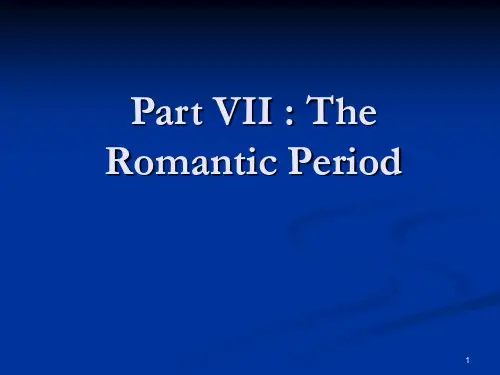英国浪漫主义文学.ppt.Convertor
- 格式:doc
- 大小:53.00 KB
- 文档页数:6


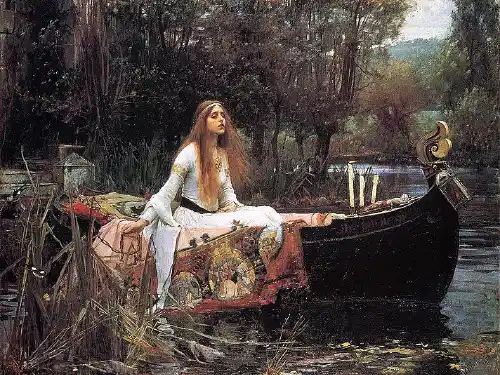
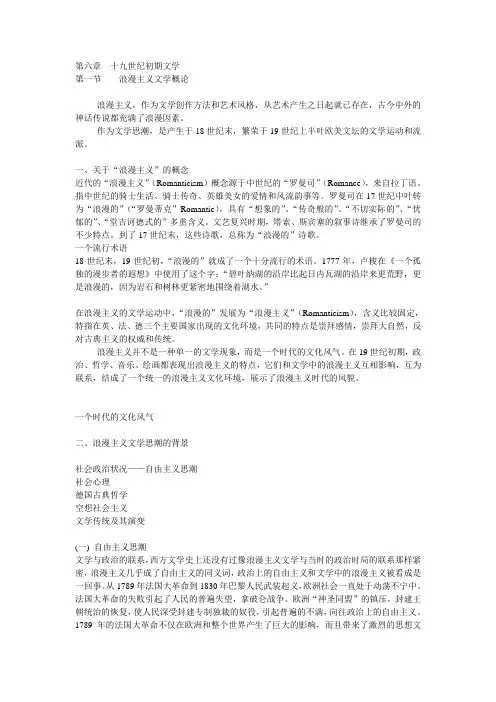
第六章十九世纪初期文学第一节浪漫主义文学概论浪漫主义,作为文学创作方法和艺术风格,从艺术产生之日起就已存在,古今中外的神话传说都充满了浪漫因素。
作为文学思潮,是产生于18世纪末,繁荣于19世纪上半叶欧美文坛的文学运动和流派。
一、关于“浪漫主义”的概念近代的“浪漫主义”(Romanticism)概念源于中世纪的“罗曼司”(Romance),来自拉丁语。
指中世纪的骑士生活、骑士传奇、英雄美女的爱情和风流韵事等。
罗曼司在17世纪中叶转为“浪漫的”(“罗曼蒂克”Romantic),具有“想象的”、“传奇般的”、“不切实际的”、“忧郁的”、“堂吉诃德式的”多重含义。
文艺复兴时期,塔索、斯宾塞的叙事诗继承了罗曼司的不少特点。
到了17世纪末,这些诗歌,总称为“浪漫的”诗歌。
一个流行术语18世纪末,19世纪初,“浪漫的”就成了一个十分流行的术语。
1777年,卢梭在《一个孤独的漫步者的遐想》中使用了这个字:“碧叶纳湖的沿岸比起日内瓦湖的沿岸来更荒野,更是浪漫的,因为岩石和树林更紧密地围绕着湖水。
”在浪漫主义的文学运动中,“浪漫的”发展为“浪漫主义”(Romanticism),含义比较固定,特指在英、法、德三个主要国家出现的文化环境,共同的特点是崇拜感情,崇拜大自然,反对古典主义的权威和传统。
浪漫主义并不是一种单一的文学现象,而是一个时代的文化风气。
在19世纪初期,政治、哲学、音乐、绘画都表现出浪漫主义的特点,它们和文学中的浪漫主义互相影响,互为联系,结成了一个统一的浪漫主义文化环境,展示了浪漫主义时代的风貌。
一个时代的文化风气二、浪漫主义文学思潮的背景社会政治状况——自由主义思潮社会心理德国古典哲学空想社会主义文学传统及其演变(一) 自由主义思潮文学与政治的联系,西方文学史上还没有过像浪漫主义文学与当时的政治时局的联系那样紧密,浪漫主义几乎成了自由主义的同义词,政治上的自由主义和文学中的浪漫主义被看成是一回事。
从1789年法国大革命到1830年巴黎人民武装起义,欧洲社会一直处于动荡不宁中。
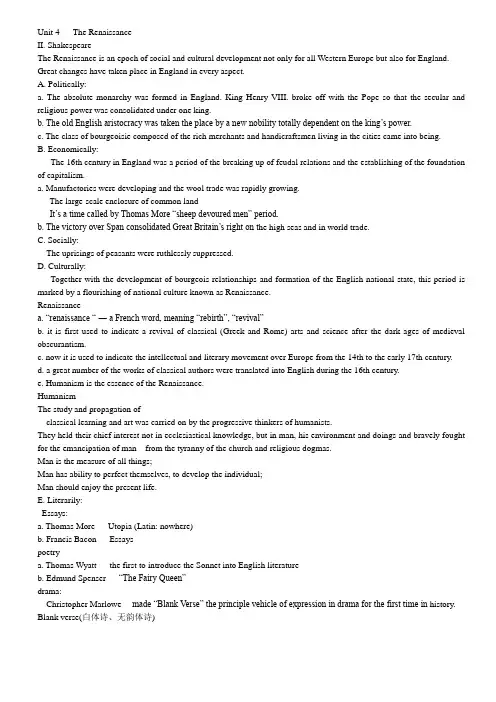
Unit 4 The RenaissanceII. ShakespeareThe Renaissance is an epoch of social and cultural development not only for all Western Europe but also for England. Great changes have taken place in England in every aspect.A. Politically:a. The absolute monarchy was formed in England. King Henry VIII. broke off with the Pope so that the secular and religious power was consolidated under one king.b. The old English aristocracy was taken the place by a new nobility totally dependent on the king’s power.c. The class of bourgeoisie composed of the rich merchants and handicraftsmen living in the cities came into being.B. Economically:The 16th century in England was a period of the breaking up of feudal relations and the establishing of the foundation of capitalism.a. Manufactories were developing and the wool trade was rapidly growing.-- The large-scale enclosure of common land-- It’s a time called by Thomas More “sheep devoured men” period.b. The victory over Span consolidated Great Britain’s right on t he high seas and in world trade.C. Socially:The uprisings of peasants were ruthlessly suppressed.D. Culturally:Together with the development of bourgeois relationships and formation of the English national state, this period is marked by a flourishing of national culture known as Renaissance.Renaissancea. “renaissance “ ― a French word, meaning “rebirth”, “revival”b. it is first used to indicate a revival of classical (Greek and Rome) arts and science after the dark ages of medieval obscurantism.c. now it is used to indicate the intellectual and literary movement over Europe from the 14th to the early 17th century.d. a great number of the works of classical authors were translated into English during the 16th century.e. Humanism is the essence of the Renaissance.HumanismThe study and propagation ofclassical learning and art was carried on by the progressive thinkers of humanists.They held their chief interest not in ecclesiastical knowledge, but in man, his environment and doings and bravely fought for the emancipation of man from the tyranny of the church and religious dogmas.Man is the measure of all things;Man has ability to perfect themselves, to develop the individual;Man should enjoy the present life.E. Literarily:Essays:a. Thomas More --- Utopia (Latin: nowhere)b. Francis Bacon --- Essayspoetrya. Thomas Wyatt --- the first to introduce the Sonnet into English literatureb. Edmund Spenser --- “The Fairy Queen”drama:Christopher Marlowe--- made “Blank Verse” the principle vehicle of expression in drama for the first time in history. Blank verse(白体诗、无韵体诗)unrhymed iambic pentameter (五步抑扬格with five feet unstressed syllable + stressed syllable ) 2. William Shakespeare (1564―1616)2. William Shakespeare (1564―1616)His Life1564, Born in Stratford-on-Avon1588-1592, in London as actor and playwright1592-98, devoted himself mainly to history plays and comedies1601-1609, wrote the greatest tragedies and romantic comedies1610, retired to Stratford1616, died.2.2 His writing careerFour periods:1588-1594 period of apprenticeship 10 plays1595-1600 lyrical poems; historical playsand comedies 2plays1601-1607 great tragedies; dark comedies(tragicomedies) 11plays1608-1613 romantic drama 4playsFour types of his plays:a. comedy:The Twelfth NightA Midsummer Night’s Dreamb. tragedy: Four greatest tragedies: Hamlet Othello King Lear Macbethc. tragic-comedy:The Merchant of Venice;The Tempestd. historical playsHenry VI2.3 Shakespeare’sachievement and significance2 long narrative poems;154 sonnets;37 playsa. represents the climax of the Renaissance;b. one of the few writers who can be said indispensable in the European literary history; (Homer, Dante and Shakespeare)c. the most influential man of letter since the Renaissance:d. an encyclopedia of the Elizabethan Agee. the representative of the Renaissance literature in general;f. “He’s not of an age, but of all time" — Ben Jonsong. he had the largest command of vocabulary.- 16,000 different wordsTo preview “To be or not to be” soliloquyTo preview “Sonnet 18”。
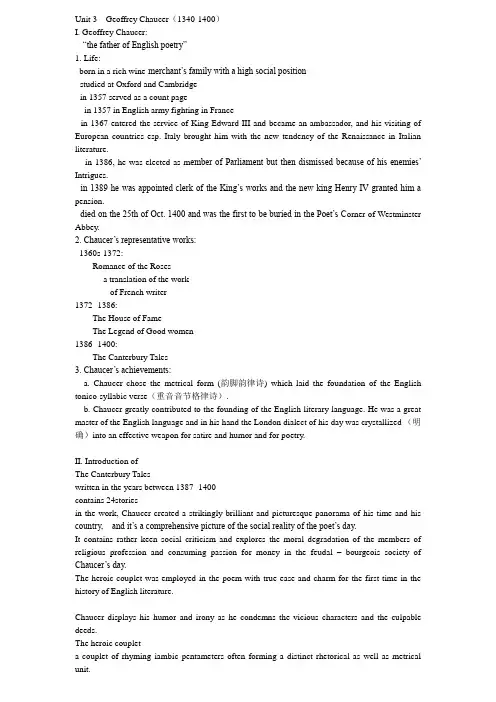
Unit 3 Geoffrey Chaucer(1340-1400)I. Geoffrey Chaucer:-- “the father of English poetry”1. Life:born in a rich wine-merchant’s family with a high social position- studied at Oxford and Cambridge- in 1357 served as a count page- in 1357 in English army fighting in France- in 1367 entered the service of King Edward III and became an ambassador, and his visiting of European countries esp. Italy brought him with the new tendency of the Renaissance in Italian literature.- in 1386, he was elected as m ember of Parliament but then dismissed because of his enemies’ Intrigues.- in 1389 he was appointed clerk of the King’s works and the new king Henry IV granted him a pension.- died on the 25th of Oct. 1400 and was the first to be buried in the Poet’s C orner of Westminster Abbey.2. Chaucer’s representative works:1360s-1372:Romance of the Roses--- a translation of the workof French writer1372- 1386:The House of FameThe Legend of Good women1386- 1400:The Canterbury Tales3. Chaucer’s achievements:a. Chaucer chose the metrical form (韵脚韵律诗) which laid the foundation of the English tonico-syllabic verse(重音音节格律诗).b. Chaucer greatly contributed to the founding of the English literary language. He was a great master of the English language and in his hand the London dialect of his day was crystallized (明确)into an effective weapon for satire and humor and for poetry.II. Introduction ofThe Canterbury Taleswritten in the years between 1387 -1400contains 24storiesin the work, Chaucer created a strikingly brilliant and picturesque panorama of his time and his country, and it’s a comprehensive picture of the social reality of the poet’s day.It contains rather keen social criticism and explores the moral degradation of the members of religious profession and consuming passion for money in the feudal –bourgeois society of Chaucer’s day.The heroic couplet was employed in the poem with true ease and charm for the first time in the history of English literature.Chaucer displays his humor and irony as he condemns the vicious characters and the culpable deeds.The heroic coupleta couplet of rhyming iambic pentameters often forming a distinct rhetorical as well as metrical unit.The origin of the form in English poetry is unknown, but Geoffrey Chaucer in the 14th century was the first to make extensive use of it. The heroic couplet became the principal metre used in drama about the mid-17th century, and the form was perfected by John Dryden and Alexander… III. Close reading of the part “General Prologue”1. Its significance:a. the most important part of the whole poemb. it is a whole gallery of vivid characters from all walks of lifeC. it is a splendid masterpiece of realistic portrayal, the first of its kind in the history of English literatureIII. Close reading of the part “General Prologue”3. Analysis of some parts of it:IV. Popular Ballads:1. Definition:Ballads are anonymous narrative songs that have been preserved by oral transmission.Popular ballads are songs and ballads which were widespread among the populace of England and Scotland and created and preserved by the people.2. Types: Historical Legendary Fantastical Ballads Lyrical Humorous3. Robin Hood BalladsRobin Hood Ballads:the ballads which reflect Robin Hood’s feats.Robin Hood:is a Saxon by birth, an outlaw, a robber but he robbed only the rich and never molested the poor and the needy.“Get Up and Bar the Door”。
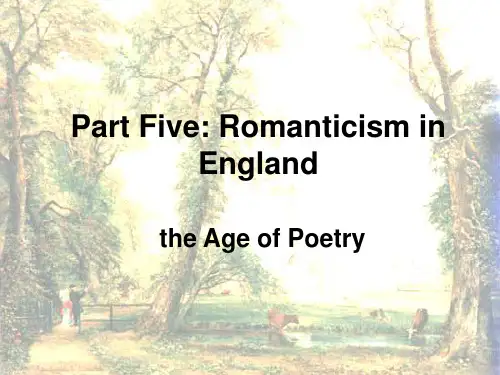
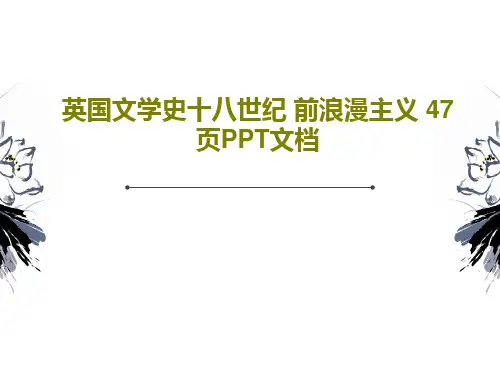
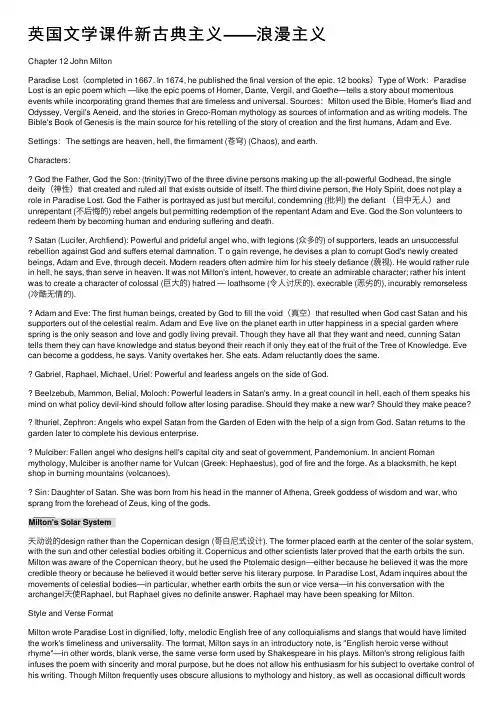
英国⽂学课件新古典主义——浪漫主义Chapter 12 John MiltonParadise Lost(completed in 1667. In 1674, he published the final version of the epic. 12 books)Type of Work:Paradise Lost is an epic poem which —like the epic poems of Homer, Dante, Vergil, and Goethe—tells a story about momentous events while incorporating grand themes that are timeless and universal. Sources:Milton used the Bible, Homer's Iliad and Odyssey, Vergil's Aeneid, and the stories in Greco-Roman mythology as sources of information and as writing models. The Bible's Book of Genesis is the main source for his retelling of the story of creation and the first humans, Adam and Eve.Settings:The settings are heaven, hell, the firmament (苍穹) (Chaos), and earth.Characters:God the Father, God the Son: (trinity)Two of the three divine persons making up the all-powerful Godhead, the single deity(神性)that created and ruled all that exists outside of itself. The third divine person, the Holy Spirit, does not play a role in Paradise Lost. God the Father is portrayed as just but merciful, condemning (批判) the defiant (⽬中⽆⼈)and unrepentant (不后悔的) rebel angels but permitting redemption of the repentant Adam and Eve. God the Son volunteers to redeem them by becoming human and enduring suffering and death.Satan (Lucifer, Archfiend): Powerful and prideful angel who, with legions (众多的) of supporters, leads an unsuccessful rebellion against God and suffers eternal damnation. T o gain revenge, he devises a plan to corrupt God's newly created beings, Adam and Eve, through deceit. Modern readers often admire him for his steely defiance (藐视). He would rather rule in hell, he says, than serve in heaven. It was not Milton's intent, however, to create an admirable character; rather his intent was to create a character of colossal (巨⼤的) hatred — loathsome (令⼈讨厌的), execrable (恶劣的), incurably remorseless (冷酷⽆情的).Adam and Eve: The first human beings, created by God to fill the void(真空)that resulted when God cast Satan and his supporters out of the celestial realm. Adam and Eve live on the planet earth in utter happiness in a special garden where spring is the only season and love and godly living prevail. Though they have all that they want and need, cunning Satan tells them they can have knowledge and status beyond their reach if only they eat of the fruit of the Tree of Knowledge. Eve can become a goddess, he says. Vanity overtakes her. She eats. Adam reluctantly does the same.Gabriel, Raphael, Michael, Uriel: Powerful and fearless angels on the side of God.Beelzebub, Mammon, Belial, Moloch: Powerful leaders in Satan's army. In a great council in hell, each of them speaks his mind on what policy devil-kind should follow after losing paradise. Should they make a new war? Should they make peace?Ithuriel, Zephron: Angels who expel Satan from the Garden of Eden with the help of a sign from God. Satan returns to the garden later to complete his devious enterprise.Mulciber: Fallen angel who designs hell's capital city and seat of government, Pandemonium. In ancient Roman mythology, Mulciber is another name for Vulcan (Greek: Hephaestus), god of fire and the forge. As a blacksmith, he kept shop in burning mountains (volcanoes).Sin: Daughter of Satan. She was born from his head in the manner of Athena, Greek goddess of wisdom and war, who sprang from the forehead of Zeus, king of the gods.天动说的design rather than the Copernican design (哥⽩尼式设计). The former placed earth at the center of the solar system, with the sun and other celestial bodies orbiting it. Copernicus and other scientists later proved that the earth orbits the sun. Milton was aware of the Copernican theory, but he used the Ptolemaic design—either because he believed it was the more credible theory or because he believed it would better serve his literary purpose. In Paradise Lost, Adam inquires about the movements of celestial bodies—in particular, whether earth orbits the sun or vice versa—in his conversation with the archangel天使Raphael, but Raphael gives no definite answer. Raphael may have been speaking for Milton.Style and Verse FormatMilton wrote Paradise Lost in dignified, lofty, melodic English free of any colloquialisms and slangs that would have limited the work's timeliness and universality. The format, Milton says in an introductory note, is "English heroic verse without rhyme"—in other words, blank verse, the same verse form used by Shakespeare in his plays. Milton's strong religious faith infuses the poem with sincerity and moral purpose, but he does not allow his enthusiasm for his subject to overtake control of his writing. Though Milton frequently uses obscure allusions to mythology and history, as well as occasional difficult wordsand phrases, his language is never deliberately affected or ostentatious炫耀的. What is more, it does not preach and does not take the reader on circumlocutory迂回的expeditions. Like a symphony composer—mighty Beethoven, for example —Milton is always in control, tempering his creative genius with his technical discipline.With a good dictionary and an annotated有注解的text, a first-time reader of Milton can easily follow and understand the story while developing an appreciation for the exquisite writing.Epic ConventionsIn Paradise Lost, Milton used the classical epic conventions—literary practices, rules, or devices established by Homer that became commonplace in epic poetry. Some of these practices were also used in other genres ofliterature. Among the classical conventions Milton used are the following:(1) The invocation 祈祷of the muse, in which a writer requests divine help in composing his work.(2) Telling a story with which readers or listeners are already familiar; they know the characters, the plot, and the outcome. Most of the great writers of the ancient world—as well as many great writers in later times, including Shakespeare—frequently told stories already known to the public. Thus, in such stories, there were no unexpected plot twists, no surprise endings. If this sounds strange to you, the modern reader and theatergoer, consider that many of the most popular motion pictures today are about stories already known to the public.(3) Beginning the story in the middle, a literary convention known by its Latin term in media res资源(in the middle of things). Such a convention allows a writer to begin his story at an exciting part, then flash back to fill the reader in on details leading up to that exciting part.(4) Announcing or introducing a list of characters who play a major role in the story. They may speak at some length about how to resolve a problem (as the followers of Satan do early in Paradise Lost).(5) Conflict in the celestial realm. Divine beings fight and scheme against one another in the epics of Homer and Vergil, and they do so in Paradise Lost on a grand scale, with Satan and his forces opposing God and his forces. (6) Use of dramatic irony. Dramatic irony is a literary device in which a character in a story fails to see or understand what is obvious to the audience or readers. Dramatic irony appears frequently in the plays of the ancient Greeks. ImageryMilton's imagery is at times graceful and elegant, as in this memorable personification in Book 6 [Waked by the circling hours, with rosy hand Unbarred the gates of light. (lines 2-4)]At other times, the imagery is imposing and awe-inspiring, as in this description in Book 7In Book 8, Milton describes the commission of the first sin in simple, straightforward language, followed by a succinct personification summing up the terrible effects of the iniquityMilton also uses personification in Book 4 in this beautiful passage about a quiet night, the starry sky, and the ascendancy of the moonEnjambment跨⾏连续Milton uses frequently uses enjambment (also spelled enjambement) in the poem. It is a literary device in which a poet does not complete his sentence or phrase at the end of one line but allows it to carry over to the next line. Milton's use of enjambment helps the poem flow from one line to the next.Of man's first disobedience, and the fruitBrought death into the world. . .(Book 1, lines 1-3)Of that forbidden tree, whose mortal tasteMain ThemeIn Book 1 of Paradise Lost, Milton reveals the central theme of the work: to justify the ways of God to man. Justify here means to explain and defend, and ultimately to vindicate澄清, God’s course of action in dealing with Adam and Eve after they succumbed to the temptation of Satan and ate forbidden fruit.Other ThemesInordinate 过度的pride: It leads to Satan's downfall and his continuing defiance of God.Envy: Arising from Satan's pride, it makes him jealous of God the Son, who is the favorite of God the Father. Revenge: It motivates Satan to corrupt Adam and Eve and thereby subvert God's plans.Vanity: It leads Eve to believe—under the temptation of Satan—that she can become godlike.Deceit: Satan appears in many disguises and tells many lies during his mission to trick Adam and Eve.Infidelity: Adam betrays God by siding with Eve and eating the forbidden fruit.Unbridled 不受约束的pursuit of knowledge: It leads Adam and Eve to seek knowledge beyond their ken, knowledge that will make them godlike.Volition意志: Angels and humans alike possess free will, enabling them to make decisions. Satan freely chooses to rebel against God, and Adam and Eve freely choose to eat forbidden fruit. The consequences of their actions are their own fault, not God's. Milton uses this theme to help support the central theme, "to justify the ways of God to man."Disobedience违抗: All sins are acts of disobedience against God, impairing or cutting off the sinner's relationship with God. Adam and Eve and all of the devils disobey God through their sins.Loyalty: Loyalty to God and his ways are necessary for eternal salvation. Loyalty requires obedience. All of the good angels exhibit loyalty.Repentance悔悟: Even though Adam and Eve have disobeyed God, their repentance makes them eligible for eventual salvation.Hope: At the end of Paradise Lost, Adam and Eve enter the imperfect world with hope; they can yet attain eternal salvation. Redemption赎回: Through the suffering and death of the Son of God, sinful man can reconcile himself with God if he is sincerely sorry for his sins.ClimaxThe climax, or turning point, of Paradise Lost occurs when Adam and Eve succumb to Satan's temptations and eat the forbidden fruit. This act of disobedience results in their downfall and eviction from Paradise.What Is an Angel?An angel is a supernatural being that serves God by praising and adoring Him and by carrying out special missions that assist humans. Angels have the additional task of opposing and punishing devils. Devils are angelscast out of heaven because they rebelled against God. The word angel derives from the Greek word angelos, meaning messenger. The major western religions—Christianity, Judaism, and Islam—all accept the existence of angels. The rank of angels from highest to lowest is as follows:1. Seraphim (Seraph)2. Cherubim (Cherub)3. Thrones4. Dominations5. Virtues6. Powers7. Principalities8. Archangels9. AngelsChapter 13 The Seventeenth-Century Prose2007-11-12 13:53I. Bible1. The Bible is the name given to the revelation of God to man contained in sixty-six books or pamphlets, bound together and forming one book.2. The Books of the Bible:Old Testament(39 Books, written in the Hebrew language between 1400 and 400B.C. )About the creation of the world, the origin of the Jewish people, its history, religion, law, and poetry. New Testament(27 Books, written in the Greek language between 40 and 100 A.D.)About Jesus Christ’s life, his deeds and teachingsSon of an important official / Studied law, became a barrister and entered House of Commons, legal advisor to Elizabeth I / Attorney General and Lord Chancellor under James I; forced out of office in 1621 / Retired to his estate to write and study / Tried to convince Elizabeth I and James I to embrace natural philosophy as statecraft2. Major WorksEssays (1594)The Advancement of Learning (1605) Great Instauration and Novum Organum (1620) New Atlantis (posthumous)3. Important Baconian ideas●Reliance on the evidence of the senses and instruments●Progress through technology●Technological transformation of nature to make it useful to humanity●State Institutions of science: institutes, centralization, technocratic expertise4. Bacon’s Essays●Essay as a form of literature, the essay is a composition of moderate length, usually in prose, which deals in aneasy, cursory way with the external conditions of a subject, and, in strictness, with that subject, only as it affects the writer. The essay was invented by Montaigne.●Bacon’s essaysBacon offers his views on a whole smorgasbord of topics ranging from Truth, Death,' Adversitie', Marriage & the single life, Love, Boldness, Superstition, Friendship, Health, Ambition, Youth, Beauty to Anger & Fame.Features of Bacon’s essays●Bacon’s essays are the first example of that genre in English lit erature and have been recognized as animportant landmark in the development of English prose. The essays are famous for the pithy aphoristic style, which he had defended in principle in The Advancement of Learning as proper for the expression of tentative opinions.●There is an obvious stylistic change in the Essays. The sentences in the first edition are charged and crowdedwith symmetries. They are composed in a rather affected way. However, the final edition not only enlarges the range of theme, but also brings forth the looser and more persuasive style.●The essays are well arranged and enriched by Biblical allusions, metaphors and cadences. In general, Bacon’s literary style is noted for three prominent qualities: directness, terseness, and forcefulness.II. John Bunyan (1628-1688)1. Life and CareerHad very little schooling, but abnormally active imagination with dreams and fears of devils and hell-fire / Worked in the tinker's trade / Served in the parliamentary army / Married in 1649 / Joined a non-sectarian church / Was arrested and imprisoned for making illegal preaching in the surrounding villages / Wrote Pilgrim’s Progress in Prison2. Points of View●Religiously, a devout Christian, and a firm non-conformist of the Anglican Church, he believed that man’s final salvation could be achieved only by one’s own spiritual struggle.●Politically, with a deep hatred for the corrupted, hypocritical rich, he condemned oppression, falsehood,indulgence in pleasure seeking and many other vices of the money-corrupted upper class, but eulogized the truth-seeking Christian.3. The Pilgrim's Progress(1) Story : A tale of adventure on a perilous path, encountering giants, wild beasts, hobgoblins, etc. The tale based on human experience: e.g. the moving account of his death with Hopeful(2) Major charactersChristian Faithful Hopeful Giant Despair Ignorance Christiana(3) Major theme:●Spiritual salvation for mankind●The cost of salvation●The road to salvation is difficult and lonely ●Salvation is attainable by all who seek it. ●To grow in holiness is a daily battle, in which therewill be setbacks and encouragements, but which isa battle worth fighting(4) The basic metaphor: Life is a journey.●"Everyone sojourning in the flesh is passing through this earth to a mysterious state of future bliss .... thePilgrim's progress is toward no earthly destination.―●The journey is from this world to the next world.●Pilgrim, one who strives to obtain salvation of their soul through a physical journey in which love for God, and notlove for material things, drives them.●Pilgrimage: the journey to a distant sacred goal; it is found in all the great religions of the world. It is a journeyboth outwards to hallowed places and inwards to spiritual improvement; it can express penance for past evils, or the search for future good; the pilgrim may pursue spiritual ecstasy in the sacred sites of a particular faith, or seek a miracle through the medium of God or a saint.●Johnson praised John Bunyan highly. "His Pilgrim's Progress has great merit, both for invention, imagination,and the conduct of the story; and it has had the best evidence of its merit, the general and continued approbation of mankind. Few books, I believe, have had a more extensive sale. It is remarkable, that it begins very much like the poem of Dante; yet there was no translation of Dante when Bunyan wrote. There is reason to think that he had read Spenser."(5) Special features●The most successful religious allegory in English language●Vivid characterization: Travelers who represent states of the soul, or moral attitudes●Style: Modeled on the prose style of the English Bible; Simple diction; colloquial expressions; andstraightforward sentence structuresIII. John Dryden (1631-1700)1. Life and CareerBorn in a country g entry’s family / Received his education at Cambridge / Shifted to the royalist side after Restoration / Became a prominent poet, dramatist, and critic in his time2. Major WorksAbsalom and AchitophelAntony and Cleopatra: All for LoveAn Essay of Dramatic Poesy3. Influence on Literature●Dryden is the ―lock by which the waters of English poetry were let down from the mountains of Shakespeare andMilton to the plain of Pope.‖●His satire exerted a fruitful influence on the most brilliant verse satirists of the next century.●As a prose writer, Dryden had a very marked influence on English literature in shortening his sentences, andespecially in writing naturally, without depending on literary ornamentation to give effect to what he is saying.Primarily focusing on drama, the poetry of plays, he creates a dialogue between poet/critics of He chooses to review the existing, generally accepted conventions and decide in what respects they are being followed, or whether they should be followed by English writers.Chapter 14 Introduction to the 18th centuryI. Introductory Remarks:The period (1660-1798) began with the Restoration of Charles II, during whose reign the leading literary figure was John Dryden, with whom the neoclassical literature came into being, and concluded with the death of Samuel Johnson in 1784, the last important advocate of neoclassicism. By Johnson’s death, neoclassicism came to a decline the 18th century. Complacency (self-satisfaction) marked the beginning of the 18th century. The upper classes, in complete control now, wanted no religious enthusiasts and revolutionaries. They believed in reason. This rational approach to social and literary problems have given it the title of ―The Age of Reason‖, while the desire for perfect form which resulted in adaptations of Greek and Latin models has caused it to be called ―The Neoclassic Age.‖1. The Glorious Revolution (1688)1) James II (reactionary rule and ruthless suppression of the Protestant rebellion) / discontent from the bourgeoisie and the aristocracy / Mary and her husband, William were invited to be joint sovereigns of the English throne / James II was forced to abdicate and fled to France in 1688. / This was called the Glorious or Bloodless Revolution in England2) After that England gradually became a constitutional monarchy, and power passed from the king to the parliament and the cabinet.2. Religious ConflictsWith the triumph of the Glorious Revolution, the conflicts were very intense between the Anglican Church and its two adversaries – Protestant Dissenters and Roman Catholics. Finally England was firmly established as a dominantly Protestant nation. In the late 17th century, Deism⾃然神教admitted their belief in a Supreme Being or the God as the creator of the world, but they glorified reason and so rejected the so-called “revealed”religious truth.(reason underlying the so-called “revealed”religious truth)3. The Rapid Expanding of the British Empirethe defeat of the Holland navy; a series of victories over France / the Act of Union of 1707 – Great Britain / from Canada in the west to India in the east / Swift, Burke, Sheridan and Goldsmith (from Ireland); Thomson, Boswell, Hume and Burns (from Scotland).4. The Industrial Revolutionthe discovery of the Laws of Gravitation by Newton; steam engine (James Watt); te xtile machines… / the Enclosure 5. Two-Party Politics (The Tory and the Whig)the Tory (conservative) defended the kingship, the old traditions and the noble country families / the Whig (liberal) sought toincrease the powers of the Parliament and to advance commerce and education.6. Connection between Politics and Literaturepolitical pamphlets / literary men were eager to offer their services in shaping the government7. The American War of Independence and the French Revolution (1789-1794)The century closed, however, with revolutions, exploding in the American colonies and in France. Though these outbursts of revolutionar y movements did not change England’s position as a big industrial and capitalist power, they had the most far-reaching influences upon men’s thoughts and were left most deeply in literature, esp in the literature of the Age of Romanticism which followed.III. Enlightenment启蒙运动and its effects on English literature1. It was a progressive intellectual movement throughout Western Europe in the 18th and Russia in the 19th centuries. The movement was, on the whole, an expression of the struggle of the bourgeoisie against feudalism. The enlighteners fought against class inequality, stagnation停滞, prejudices and other feudal survivals.2. The enlightenment was so called because it considered the chief means for the betterment of the society was the―enlightenment‖ or ―education‖ of the people. In other words they believed in the power of reason and their watchword was ―common sense‖. That is why the 18th century in England has often been called ―the Age of Reason‖. Most of the enlightenment thinkers believed that social problems could not be solved by church doctrines or by the power of God but should be solved with human intelligence.3. Most of the important writers of the 18th century belonged to the enlightenment. In their works these writers criticized different aspects of contemporary England, discussed social problems and the management of the government, and some even partly defended the interests of the exploited laboring masses, the peasants, and the working people in the cities. The literature of the Enlightenment in England mainly appealed to the middle class readers.IV. Neo-Classicism1. Neoclassicism was a reaction against the intricacy 复杂and occasional obscurity晦涩, boldness and the extravagance of European literature of the late Renaissance, and in favor of simplicity, clarity, restraint, regularity and good sense. In England, neoclassicism was initiated by Dryden, culminated in Pope and continued by Johnson.2. The writers were considered neoclassic because they modeled themselves on classical Greek or Latin authors in order to achieve perfect form in literature. The general tendency of neoclassical literature was to look at social and political life critically, to emphasize intellect rather than imagination, the form rather than the content of a sentence.3. Chief characteristics of Neoclassic literature1) The neoclassic writers manifested a strong traditionalism, which was clearly shown in their immense respect for classical writers.2) The neoclassic believed that literature was primarily an ―art‖, which must be perfected by long study and practice. They laid much emphasis on the correct, the appropriate, on restraint and discipline, paid much attention to their style, and respected the established rules of their art.3) The neoclassic regarded poetry as imitation of human life –a mirror up to nature. Emphasis was placed on what human beings possess in common (共性)–representative characteristics, and widely shared experiences, thoughts, feelings and tastes.4) The neoclassic believed that the poet is the maker – the maker of the representative images of human actions and of the world, and the purpose for which he makes this image of life is to teach. In order to teach effectively, he must please the reader by his fictions, and by all the ornaments of language, metrics and rhetoric that belong to his craft. This concept of the nature of the poet inevitably determines the didactic, satirical, artificial and orderly qualities of neoclassicism.5) The neoclassic deduced 演绎rules from the practice of early masters and invented new rules of their own.In drama, they adhered to the three unities of time, place and action, regularity in construction, and the presentation of types rather than individuals.In di ction, they highly regarded ―witty‖ expressions. They preferred the use of artificial and stock diction. ?In poetry, they demanded it to follow the ancient divisions: lyric, epic, didactic, satiric or dramatic, and each class should be guided by its own principles.In versification诗律, the age was famous for its ―closed heroic couplet‖, that is, two rhyming lines of iambic pentameter which contains within itself a complete statement and so is closed by a semicolon, period, question mark, or exclamation point.The neoclassic poetry differs from that of the Elizabethan Age in three ways. First, it is more formal, with its demand to follow exact rules, while the Elizabethans wrote in a more natural style sometimes without regard to rules; second, it is more artificial, polished, prosaic单调的, and dull and lacks the creative vigor of the Elizabethans; third, the chief poetic form of neoclassicism is heroic couplet which replaced the variety of forms in the Elizabethan Age.4. The literature of the Neoclassic Age (1660-1784)1) the first, extending to the death of Dryden in 1700, may be thought of as the period in which English ―neoclassical‖literature came into being and its critical principles were formulated; the second, ending with the death of Pope in 1744 and of Swift in 1745, brought to its culmination the literary movement; the third, concluding with the death of Johnson in 1784 and the publication of William Cowper’s The Task in 1785, was a period in which neoclassical principles gradually petered out 耗尽and were replaced by the Romantic Movement.Chapter 15 The 18th Century PoetryI. Alexander Pope (1688-1744)1. Life StoryBorn in London of a successful merchant’s family, of Roman Catholic faith / weak and crippled from childhood / did not have regular schooling but was taught at home by a priest / his only amusement was reading and writing. He taught himself by reading and translating Latin, French, Italian, and Greek poets, with the help of dictionaries and grammar books. Pope began to write poems when he was only 12.2. His Poems1) the first groupdidactic and philosophical poems, including Essay on Criticism (1711); Moral Essays (1731); An Essay on Man (1734);2) The second group contains his poems of social satires, such as the Rape of the Lock (1714); An Heroic-Comical Poem and The Dunciad3) The third group is composed of his translations of Homer’s Iliad and Odyssey.3. His Influences1) He had a brilliant wit, a sharp critical sense, and a deadly pen. He brought the neoclassicism in England to its climax.2) In his hands, the heroic couplet achieved all the finish, elegance, wit and pointedness which the form invited.3) As a technician in English verse 韵⽂he has never been excelled, and he occupied such a prominent place in the literary world of his time that not infrequently the literary epoch of early 18th century has been named after him as “The Age of Pope”. After his time, esp since the 19th century, Pope has been much criticized and some critics have called him a versifier and not a poet, meaning that he wrote clever and standardized but very mechanical sort of verse which had not flights of poetic imagination. Bla ke summarized him as ―elegant formalism‖. Byron, however, thought highly of him, defended him, and was much under his influence. Nowadays he is rated by some critics as second only to Shakespeare and Milton, and the equal of Wordsworth.II. Thomas Gray (1716-1771)The most scholarly and well-balanced of all the early romantic poets and the most outstanding of the minor poets of the mid-18th century.1. Life StoryBorn in London / educated first at Eton and then at Cambridge / spend 2 years on a grand tour of the European Continent / after graduation he continued to live at Cambridge and was appointed professor at Cambridge.2. His WorksOn Spring;。
